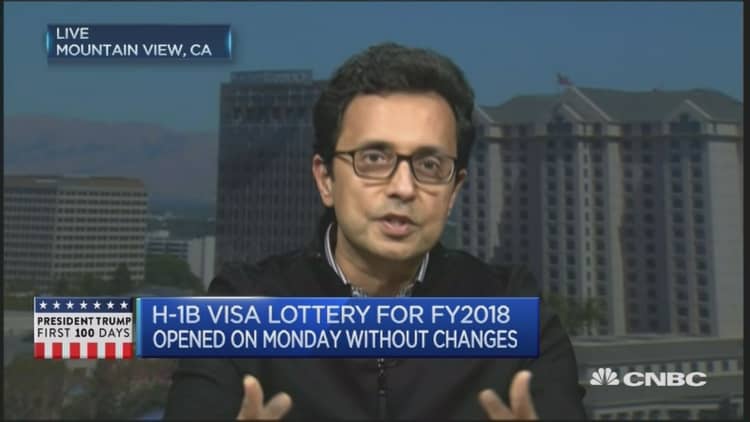
The U.S. has resumed accepting applications for its H-1B work visas, but uncertainty over the program is leading some technology firms to consider shifting business overseas if they are unable to find top talent.
"If I'm not able to get those people here in the U.S., I absolutely will have to go and find a way to hire them wherever they are," said Hitesh Sheth, CEO of U.S.-based cybersecurity start-up Vectra Networks, which uses artificial intelligence and machine learning to detect computer hacks.
The business currently conducts all of its research and development in the U.S., but Sheth didn't rule out shifting R&D overseas if it means guaranteeing access to a skilled workforce.
"It is something that I want to really resist from doing so, but at the end of the day, being competitive is one of my highest priorities, obviously. And so I'll go where the talent is," he told CNBC's "The Rundown."
The H-1B visa is for specialized workers attached to local employers who say they cannot find enough American employees with needed skills. A modest 85,000 temporary work visas are made available each year.
Still, a total of 236,000 bids were made in the program's first open week for applications last year, and each visa is randomly awarded by a computerized lottery system.
"It is that tough to find the right kind of talent, and H-1B is a crucial program in enabling companies to find the best and the brightest," said Sheth.
Vectra Networks employs about 120 people. Its core team consists of threat researchers, data scientists, network security engineers and user interface designers. According to the company, four current Vectra Networks staff members have H-1B visas.
"I assure you they are doing incredible work for us. That means we have more success with our customers, and that means we can hire more people here in the U.S.," Sheth said.
He also told CNBC he may need to apply for two or three additional H-1B visas to fill specialized roles as his business grows.
"For companies like us, who are trying to recruit the best and the brightest, we need every means available to us to be able to do that — and very often those people will be from countries outside the United States," he said.
The Trump administration has cracked down on the program and recently revised a series of H-1B guidelines aimed at entry-level software programmers and IT companies ahead of the application opening. The expedited processing of applications was also suspended.


